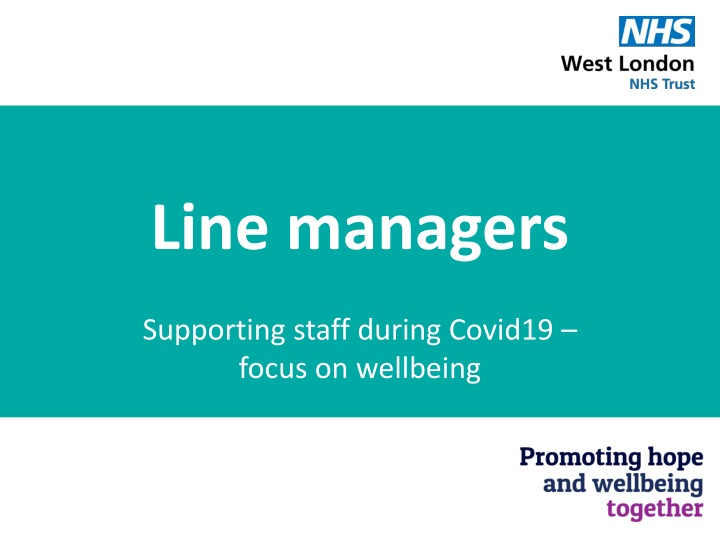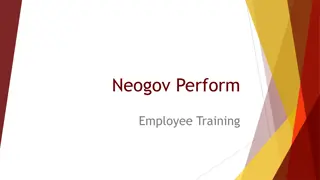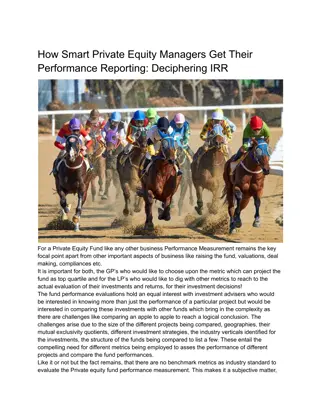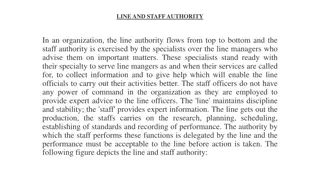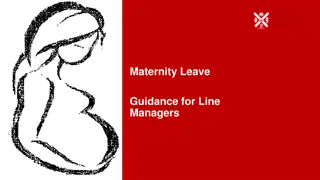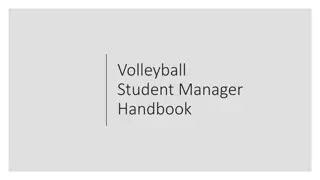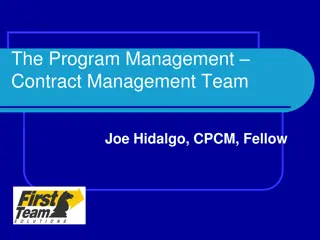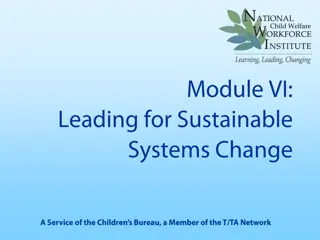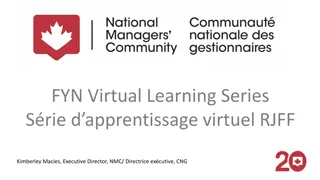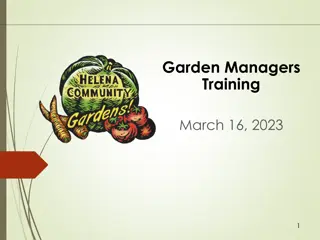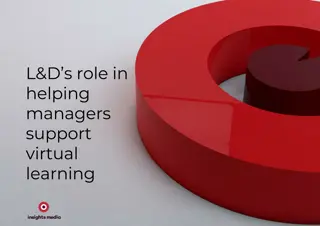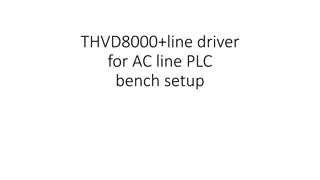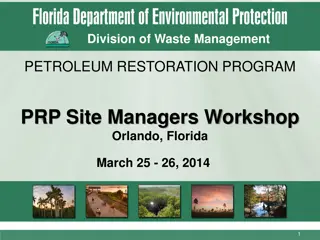Line managers
Line managers play a crucial role in supporting staff wellbeing during the Covid-19 pandemic. This includes understanding stages of staff wellbeing, best practices for support, and what may not be helpful. Resources and strategies for line managers to assist their staff effectively are also covered.
Download Presentation

Please find below an Image/Link to download the presentation.
The content on the website is provided AS IS for your information and personal use only. It may not be sold, licensed, or shared on other websites without obtaining consent from the author.If you encounter any issues during the download, it is possible that the publisher has removed the file from their server.
You are allowed to download the files provided on this website for personal or commercial use, subject to the condition that they are used lawfully. All files are the property of their respective owners.
The content on the website is provided AS IS for your information and personal use only. It may not be sold, licensed, or shared on other websites without obtaining consent from the author.
E N D
Presentation Transcript
Line managers Supporting staff during Covid19 focus on wellbeing
Overview What we know about staff wellbeing in a pandemic What you can do as a line manager What support is available Specific issues your staff may face Looking after yourself References and useful resources
Staff wellbeing what we know There are many different stages in the pandemic As we move through the stages we can expect that staff will have different concerns and need different support
Stages of pandemic and related staff wellbeing concerns chart/ diagram to be inserted.
Best practice for staff wellbeing What is likely to help Staying well: eating well, taking breaks, getting enough sleep, safety at work (inc PPE) Checking in: asking what they need, what will help and dong this regularly Clear communication: knowing what is happening, when and why. Honesty is key. Familiar support: peers at work, family and friends Referral to psychological support: for some people who are particularly vulnerable or struggling. Needs to be evidence-based
What is unlikely to help Single-sessions that require staff to talk about their thoughts or feelings this may increase the likelihood of PTSD One size fits all everyone is responding differently and will need a variety of support at different times Psychological treatment too soon most people will use their own coping mechanisms and rushing to treatment may interfere with these Generic training e.g. mental strength training no evidence this is effective and may send the wrong messages
What can a line manager do? Ask for advice from health and safety, your line manager, staffside, HR, Occupational Health Make sure everyone is taking breaks Direct to Occupational Health and staff support Display wellbeing information in staff rooms and offices Encourage staff to take annual leave Let people know about the support available Keep asking people need different things at different times Ask staff how they are in a confidential space Don t feel you have to do it all yourself -
Not sure where to start? It may be difficult to start a conversation about wellbeing You may not feel confident and your staff member may not find it easy If you have clinical training remember you shouldn t start doing an assessment refer to OH and remain in line management role There is an HSE Talking toolkit (see resources) that has a structure and specific questions to ask your team members It s not specific to Covid It has useful open-ended questions about demands at work, support available etc.
Support available Staff support phone line Occupational Health OCCUPATIONAL HEALTH HR Staffside workforce partner PARTNERSHIP WORKING Wellbeing activities e.g. mindfulness Wellbeing champions COVID WELLBEING WORK
Exhaustion and burnout Look for signs that someone may be exhausted and at risk of burnout : Tired all the time, headaches, irritability, finding it harder to make decisions, overwhelmed, withdrawn Importance of breaks and annual leave Notice if staff are working additional hours and speak to them, work Talking toolkit - focus on control and levels of responsibility
Sleep problems Sleep problems are common may have difficulty getting to sleep or waking. Leads to exhaustion and may increase likelihood of burnout. Shift workers can t stick to set times for waking and sleeping Sleepio is a clinically-evidenced sleep improvement programme that is fully automated and highly personalised, using cognitive behavioural techniques to help improve poor sleep. Free access to Sleepio for all NHS staff is active now until 31stDecember 2020. https://onboarding.sleepio.com/sleepio/access/77#1/1?utm_ca mpaign=C19_FreeAccess&utm_medium=Employers&utm_sourc e=NHSEngland
Support for staff with pre- existing conditions Two large COVID-19 studies suggest that the staff who are most in need of psychological support are the least likely to request or receive it. Check-in regularly with team members you know may be vulnerable Don t wait to offer help Suggest making an OH referral to them Focus them on what helped before encourage staff to seek help from GP or health team
Those who are shielding Many feel very isolated and cut-off Check-in regularly with staff who are shielding Include them in team meetings and other forums as much as possible via remote dial-in and video calls Look for opportunities for projects that would support the rest of the team and can be completed from home
Bereavement Staff members have lost friends, family and loved ones Ensure they know they can request Compassionate Leave. Funerals are happening with very few people allowed to be there many people are planning a celebration later on Even if someone cannot attend a funeral in person they can request compassionate leave on that dayCHECK WITH LAURA is wording OK??) Can take compassionate leave to attend events even if they don t take place for a long time(CHECK WITH LAURA is wording OK???) Each person is different. For some people returning to work is an important way of coping, having a routine and feeling normal again. For others they may find work is harder and they may need to take more time off or need more support People will be affected by bereavement for a very long time. Anniversaries and special occasions like birthdays or family celebrations can be particularly difficult times. Do express condolences and ask the person how they would like to be supported by you Don t avoid bringing up the subject because you don t want to upset them. Keep asking if there is anything that you can do to help - it may change over tim
Death of a colleague If a colleague dies then this tragedy will have a profound effect on the whole team. Additional support will need to be provided this should be for the whole team with individual support for those who need it. Contact senior managers to arrange this immediately. The Trust chaplaincy service and Occupational Health services are there to support As a line manager there are reporting processes you need to complete. These may seem insensitive but are very important to ensure the bereaved relatives receive pension and other entitlements. IR1 completed
Looking after yourself All of the advice and support applies to you as well Line managers may be holding a lot of responsibility and speaking to a lot of distressed staff it may feel overwhelming Don t feel you have to manage alone ask for help You need to take breaks Don t try and be superhuman!
Resources HR contacts Sweety Khosla HR Workforce Partner WLFS E&F London Sweety.Khosla@westlondon.nhs.uk 0208 483 2147 07736 482 982 Philip.Osibogun@westlondon.nhs.uk 01344 75 4372 07594 091 532 Alyce.Young@westlondon.nhs.uk 0208 354 8969 07872 014 512 Philip Osibogun HR Workforce Partner High Secure Services Acute MH Services CAMHS E&F Broadmoor Alyce Young HR Workforce Partner Local Services Management Finance IM&T Medical Nursing & Patient Experience Carl Fernandes HR Workforce Partner CARMHS Older Peoples Service Carl.Fernandes@westlondon.nhs.uk 0208 354 8804 07736 482 984 Nick Mendelsohn Workforce & Transformation Partner Simran Gambhir Integrated Care Services IAPT Services Nick.Mendelsohn@westlondon.nhs.uk 07565 620 702 Simran.Gambhir@westlondon.nhs.uk 07548 143 567
Resources - other Contact details for Occupational Health: 020 8354 8919; Ohealth@westlondon.nhs.uk Staffside contact details: http://theexchange/sorce/beacon/default.aspx?pageid=Unions Staff wellbeing information: http://theexchange/sorce/beacon/?pageid=CoronavirusSupportRes ources Talking toolkit (HSE) - https://www.hse.gov.uk/stress/assets/docs/stress-talking- toolkit.pdf Links to selected staff wellbeing publications Links to national support lines for staff https://people.nhs.uk/ https://people.nhs.uk/support-for-leaders/
Resources - other Links to selected staff wellbeing publications Links to wellbeing posters we would recommend are displayed in all workplaces Raising concerns and Freedom to Speak up Guardian Staff counselling and staff support line Staffside points of contact
